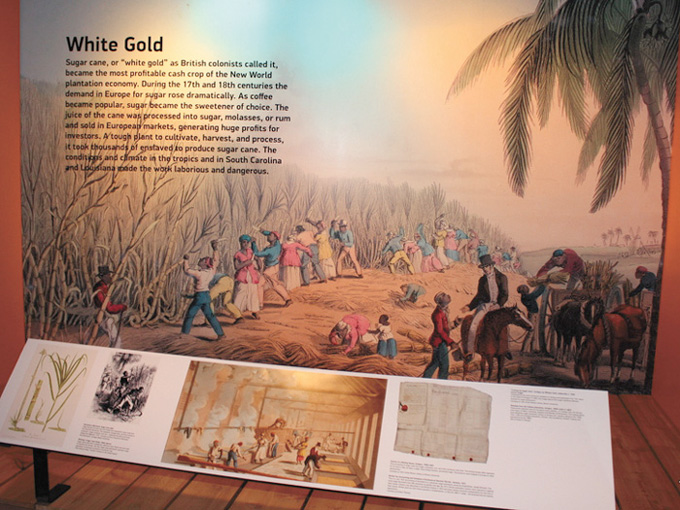
WHITE GOLD—As cotton and sugar became king throughout the South the economy boomed as a result and the demand for slaves grew. Photo above shows slaves cutting sugar canes. Photo from “From Slavery to Freedom” exhibit at Heinz History Center. (Photo by J.L. Martello)
by Ulish Carter
Courier Staff Writer
Entering the 1860s slavery and the economy throughout the South were booming. Why? Because cotton and sugar had become king. The South’s number one products were very profitable because the laborers worked for nearly nothing, and the demand for it in European countries as well as the United States was huge.
But even though the slave system was secure and profitable in the South, the Abolitionists, headed by William Lloyd Garrison and Frederick Douglass were putting forth an extremely strong fight against it, but a losing fight. Slavery was here to stay most believed, as it was institutionalized throughout the South to the point where most Southern states passed laws not only forbidding Blacks and Indians from owning slaves, but forbidding free Blacks in those states as well. And the few states that did allow freed Blacks, made them carry passes to prove they were free, and many had to renew them every year or be sold back into slavery.
However, greed eventually led to the abolition of slavery.
During the 1830s and ‘40s came the westward movement in which the U.S. was expanding west, and encouraging Whites to move west to occupy the land then occupied by Indians and Mexicans. To encourage the movement the government gave hundreds of acres of land for farming, ranching, businesses and towns. Even though this was a boom for the majority it created one of the biggest confrontations in this country’s history, the fight between people who wanted to expand slavery into the western states and those who didn’t want slaves there.
The Abolitionists, mostly throughout the North and East, headed by Garrison and Douglass were among the leaders who fought against the expansion of slavery, whereas the Southern plantation owners fought to expand their business into the vast western states. But another group, who receive very little historical recognition were the large number of Whites who didn’t want slavery, not because it was morally wrong, but economically it was bad for them. Slaves took jobs that normally would have gone to White men.
Whites may not have wanted to work the cotton fields but slaves were being trained to do everything on the farm, from building the masters’ houses and barns, to breeding their animals, to black smiths. With the vast, vast majority of Whites being illiterate people who were moving west to better their lives because of the poverty in the South and Eastern states they didn’t want to see free labor taking their jobs. As a result there were several routes, in which Blacks were beaten and killed by White mobs.
This led to the Missouri Compromise, which was supposed to be the compromise to end this dispute. But greed overruled the compromise.